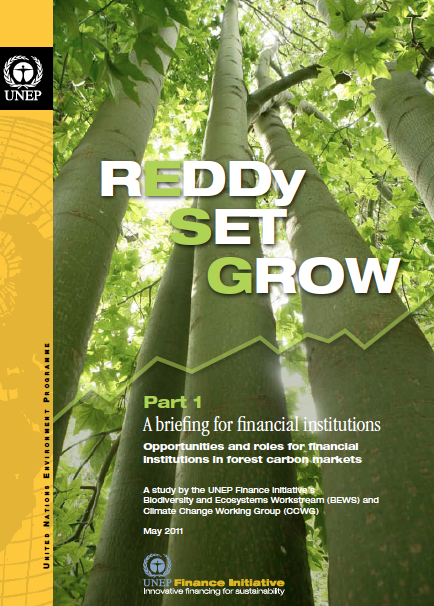To study, titled “REDDy-Set-Grow: Opportunities and roles of financial institutions in forest carbon markets,” provides a briefing to the financial world on current and emerging avenues for business activity in forest-carbon and highlights roles and barriers for financial institutions to become involved.
 6 May 2011: The UN Environment Programme Finance Initiative (UNEP FI) has released a report titled “REDDy-Set-Grow: Opportunities and roles of financial institutions in forest carbon markets,” which stresses that the financial sector must step up its engagement in the emerging green market, and proposes improved regulation to this end.
6 May 2011: The UN Environment Programme Finance Initiative (UNEP FI) has released a report titled “REDDy-Set-Grow: Opportunities and roles of financial institutions in forest carbon markets,” which stresses that the financial sector must step up its engagement in the emerging green market, and proposes improved regulation to this end.
To launch the publication, UNEP FI convened an event with financial representatives in London, UK, on 6 May 2011. During the event, finance sector attendees saluted the report as the first step of a critical learning process with the potential to sharpen their competitive edge, and enhance their role in shaping tomorrow’s green economy.
The report, the first of a two-part series, provides a briefing to the financial world on current and emerging avenues for business activity in forest-carbon, and highlights roles and barriers for financial institutions to become involved. It underscores the importance of the commitment of the private sector and financial institutions toward the implementation of REDD+ (reducing emissions from deforestation and forest degradation in developing countries, as well as conservation, sustainable management of forests and enhancement of carbon stocks), noting that the overall investment needed for implementation of REDD+ activities is predicted at US$17-33 billion per year, therefore exceeding public capabilities.
According to the study, private sector participation in REDD+ and deforestation activities can lead to a win-win scenario for the finance sector and governments, as projects offer lucrative investment opportunities and cost-effective strategies to abate carbon emissions, while protecting biodiversity and livelihoods. It states that the significant potential remains untapped due to low confidence levels of investors, resulting from an insufficient and ineffective national and international regulatory framework.
Part II of the study will provide an assessment of current international regulation and recommendations to national and international policy makers on what the international regime under the UNFCCC needs to deliver to effectively mobilize private finance and investment for forest-based climate change mitigation. [Publication: REDDy-Set-Grow: Opportunities and Roles of Financial Institutions in Forest Carbon Markets] [UNEP Press Release]